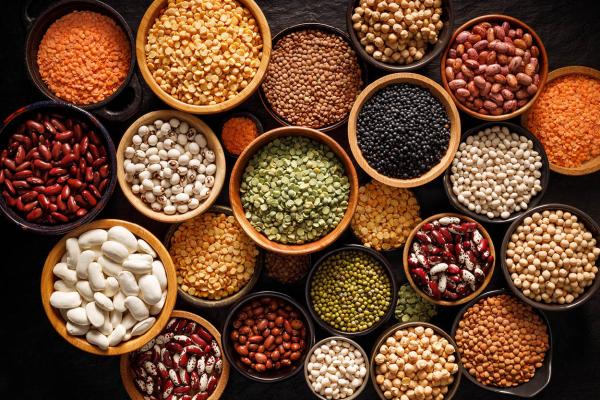
The European arable crop sector supplied 64 million tonnes of crude protein in 2023-24. The main part of this volume comes from roughage, followed by cereals and oilseeds. Dry pulses only represent 1.1 million tonnes. However, this volume does not cover all the EU needs of the food, feed and industrial sectors. To cover its plant protein deficit, the European Union (EU) imports plant-based products that amount to 19 million tonnes of crude protein. In its Versailles declaration, the European Council called for boosting EU plant protein production. In the form of four factsheets, the European Commission is publishing today a wide overview of the plant protein market in the EU, from supply and demand to CAP interventions and national initiatives.
Information on the supply and demand of protein in the EU
The first factsheet highlights key aspects in the supply and demand of protein in the EU. As regards EU-grown plant protein sources, roughage is the main source of EU origin plant protein, and rapeseed is the main protein-rich plant cultivated in the EU. However, the EU at the same time greatly relies on imports of soya bean and soya meal. The factsheet presents detailed data on feed use in different livestock species and their reliance on imported plant protein. It also presents data on the transformation of plant protein in livestock production. .
CAP interventions to decrease the EU deficit on plant protein
The second factsheet reports on Common Agricultural Policy (CAP) support to decrease the EU’s import dependency on plant protein. It describes the status of leguminous crops under the CAP strategic plan regulation, and the reasons presented by Member States to support those crops. 20 CAP Strategic Plans use coupled income support for protein crops, and this is one of the main ways in which Member States support the sector. Almost all Member States have planned at least one eco-scheme or Agri-Environment and Climate Commitments intervention to promote the inclusion of protein crops in arable cropping systems, due to the climatic and environmental benefits provided. Only two Member States used the new possibility offered by the current CAP to implement sectorial interventions on protein crops.
Member States’ initiatives for a sustainable and resilient protein supply and demand
The third factsheet presents several national and regional initiatives related to the development of sustainable and resilient protein supply and demand. The transition to more sustainable and resilient protein supply and demand systems requires coordinated action at all levels of governance, across policy fields, and throughout the supply chain. A survey launched by the Commission in 2023 towards Member States showed that most have initiatives that target protein use for food and feed, as well as for alternative proteins. Several Member States focus on the entire value chain and its different levels.
Research and Innovation for reducing the EU dependency on imported plant protein
This factsheet covers research and innovation (R&I) for the supply of protein. To fill the R&I gap on legumes and protein, the EU has invested since 2015 €644 million in 125 Horizon 2020 and Horizon Europe research projects. These projects aim to develop competitive and sustainable farming systems and food chains, that can contribute to reduce the EU dependency on imported plant protein. They also look into the cultivation of legumes and other protein rich crops to improve the efficiency of protein use in the EU livestock sector, and close knowledge gaps in the ability to produce and use alternative protein sources. The EU also supports European Innovation Partnership (EIP-AGRI) Operational Groups and EU CAP Network Focus Groups that work on protein crop production, animal nutrition, or alternative proteins.
In parallel to this work, the Joint Research Centre has explored drivers, potential synergies, and trade-offs to be considered in moving towards a more sustainable and resilient protein system.
Details
- Publication date
- 8 October 2024
- Author
- Directorate-General for Agriculture and Rural Development
- Location
- Brussels

